Graduation Spotlight: Thompson finds new calling through clinical mental health counseling program
Kim Chaudoin |
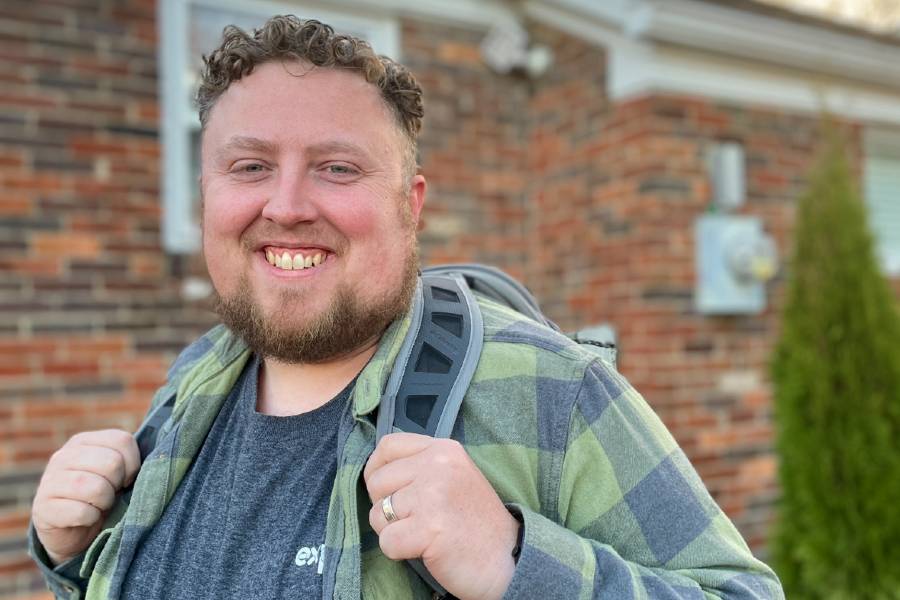
Andrew Thompson on his first day of graduate school at Lipscomb University.
For Andrew Thompson, helping people has always been more than a career aspiration — it has been a way of life.
Growing up in Trinity, a small town nestled in rural Alabama near Decatur and Huntsville, Thompson was surrounded by examples of service through his parents' work in professions that help others. That foundation of compassion, paired with more than a decade of youth ministry experience, ultimately led him to pursue a Master of Science in Clinical Mental Health Counseling at Lipscomb University — a journey he will officially complete this May as part of the College of Liberal Arts & Sciences.
“Reaching this milestone is incredibly rewarding, not just because of the hard work it represents, but because of the way it’s shaped every aspect of my life,” Thompson said.
A leap of faith
Thompson earned a Bachelor of Science in human environmental sciences from the University of Alabama, studying human development across the lifespan. But it was his work as a youth minister — and his growing awareness of the mental health struggles students faced — that inspired him to seek deeper training.
I realized there were limits to what I could offer without formal training in counseling. That was a tipping point for me. I didn’t want to find myself in a position again where I wasn’t able to provide the care and guidance someone deserved. That’s what led me to pursue this degree. — Andrew Thompson
“As a youth minister for over a decade, I’ve always believed it’s important to help students grow in their faith. But what I realized over time is that sometimes their spiritual growth was being stunted by the mental health struggles they were carrying,” he explained. “I wanted to be a safe place for them to explore those struggles and help where I could, but I began to encounter situations where I felt unequipped to truly help in the ways people needed.”
“I realized there were limits to what I could offer without formal training in counseling,” continued Thompson. “That was a tipping point for me. I didn’t want to find myself in a position again where I wasn’t able to provide the care and guidance someone deserved. That’s what led me to pursue this degree.”
At the same time, with two young children at home, Thompson recognized the need for a shift in his career that would provide more flexibility while still allowing him to do meaningful, people-focused work. Pursuing a master’s degree in clinical mental health counseling felt like a natural next step for Thompson — one that would not only grow his ability to serve others but also open up opportunities to partner with churches as a resource for their people, whether children, teenagers or adults.
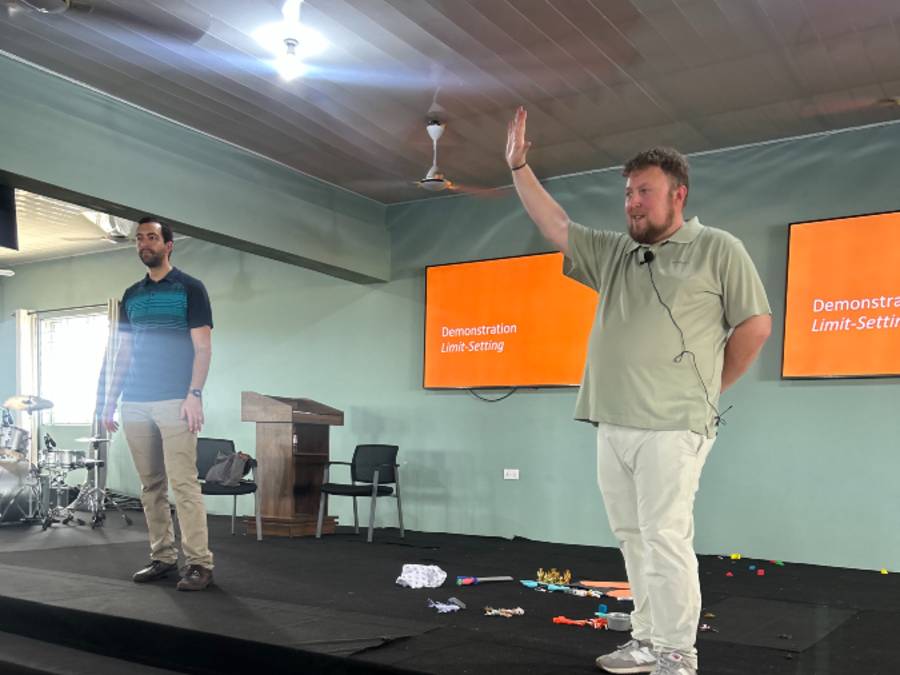
But balancing schoolwork, ministry and parenting was no small feat. Thompson intentionally protected family time, trying to keep his study time from bleeding into family time as he was already making sacrifice by missing out on ballgames, family time together and bedtime routines. Yet he says the sacrifice was worth it — not just for his future career, but for the ways it transformed his ministry and his home life in real time. Through the program, he incorporated new techniques like grounding exercises and group norms into his youth ministry and applied child-centered play therapy principles at home.
“What’s been so meaningful is how I’ve already seen this program impact my ministry. I’ve brought what I’ve learned into youth group settings. I’ve learned to be more reflective in understanding students’ responses in class or devotional settings,” Thompson said. “It’s been rewarding to put these skills into practice in that setting.”
“Even in parenting,” he continued, “I’ve seen the impact of what I’ve learned. Through studying child-centered play therapy, I’ve started incorporating choice-giving, limit-setting and using playtime to track behavior, return responsibility and reflect deeper meaning with my kids. It’s been amazing to witness how this program has shaped not just my work, but my relationships and my home.”
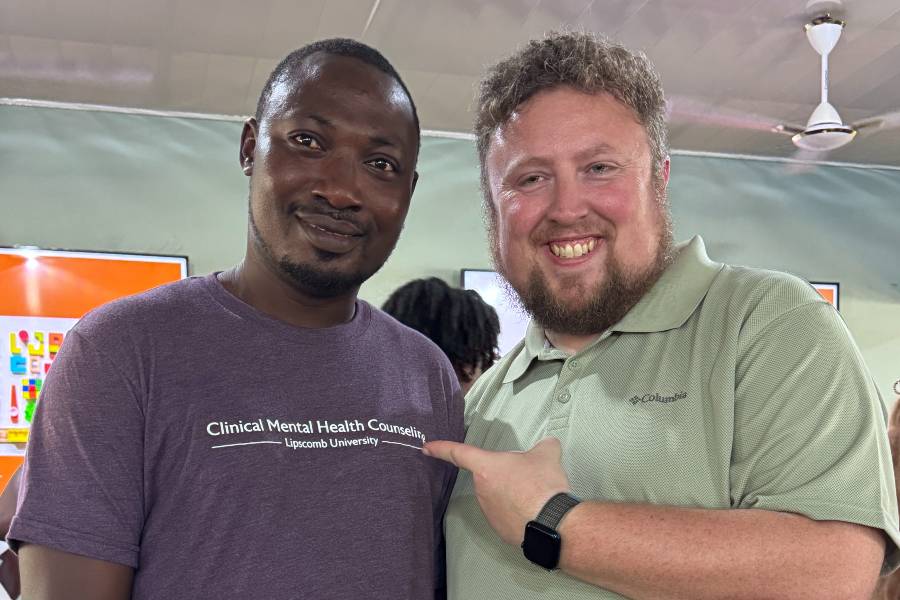
A life-changing journey to Ghana
One of the most profound experiences of Thompson’s graduate career came this spring during a mission trip to Ghana, where he helped lead workshops on child-centered play therapy.
“It’s hard to put into words how valuable that experience was for me,” he reflected. “I went to Ghana thinking I was going to help others — but in so many ways, Ghana ended up growing me.”
“As a student, it was such a priceless opportunity to get to share what I’ve been learning about child-centered play therapy with counseling professionals and students over there. I’d be lying if I said I didn’t wrestle with feeling unqualified at times, but we had such incredible support from our faculty on the trip,” said Thompson. “They encouraged us to step outside of our comfort zones, take on different parts of the workshops, and trust what we knew — so I did. And it was amazing.”
Partnering with The Pearl House, an organization founded by Lipscomb alumna Courtney Garland (’18), Thompson and his team conducted two, two-day trainings: one at the University of Ghana and one at The Pearl House in Winneba. More than 75 participants, including counseling professionals and students, attended the sessions.
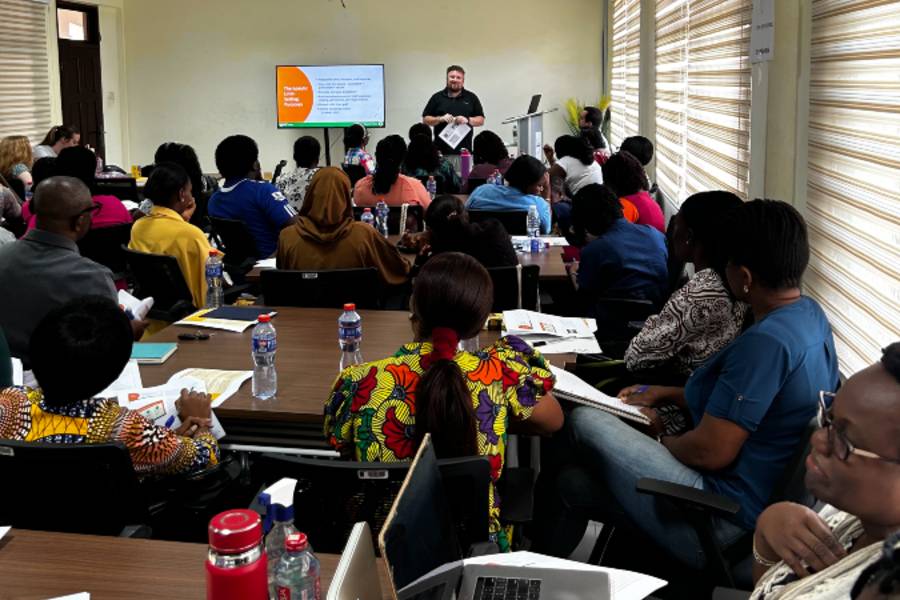
Thompson presents a lecture in Ghana.
“We answered their questions, watched them get excited about the concepts, and saw them make connections about how it could help their work with children,” he said. “It was so humbling and inspiring — their hospitality, kindness and the way they radiated God’s love moved me to tears more than once.”
Thompson credits the support of Lipscomb’s faculty and the camaraderie of his classmates for making the trip a transformative one. “I genuinely believe God had a hand in putting our team together,” he said. “There’s no one else I’d rather have stayed up talking with until 1 a.m. — they made it unforgettable.”
Finding his place at Lipscomb
Thompson almost didn’t attend Lipscomb’s CMHC interview day, initially leaning toward a different program. But after visiting campus, he knew he had found the right fit.
“I kept hearing from professionals I respected that if you want to be well-trained, deeply supported, and part of something special, this was the place to be — and they were right,” he recalled. “I vividly remember calling my wife and saying, ‘I think I found the program for me — and it’s not the one I originally thought.’ The support, the community, the reputation in the counseling world — it was everything I needed.”
The cohort model allowed Thompson to build strong relationships with his classmates, walking through the intense and rewarding experience of graduate school together. The faculty’s mentorship and encouragement, he said, made all the difference.
“They didn’t just teach me to be a counselor. They taught me how to believe in the person God created me to be,” Thompson said. “Their guidance challenged me academically and personally, but it was always rooted in care and support.”
“On top of all that, the opportunities I’ve had, like the Ghana trip, have stretched me in ways I never expected and made me feel like I’m part of something bigger than just earning a degree,” he continued. “Lipscomb has helped me become not just a better counselor, but a better parent, minister and person. I’m really grateful I chose this program, and looking back, I honestly can’t imagine having gone anywhere else. My experience at Lipscomb has been so much more than I could have hoped for.”
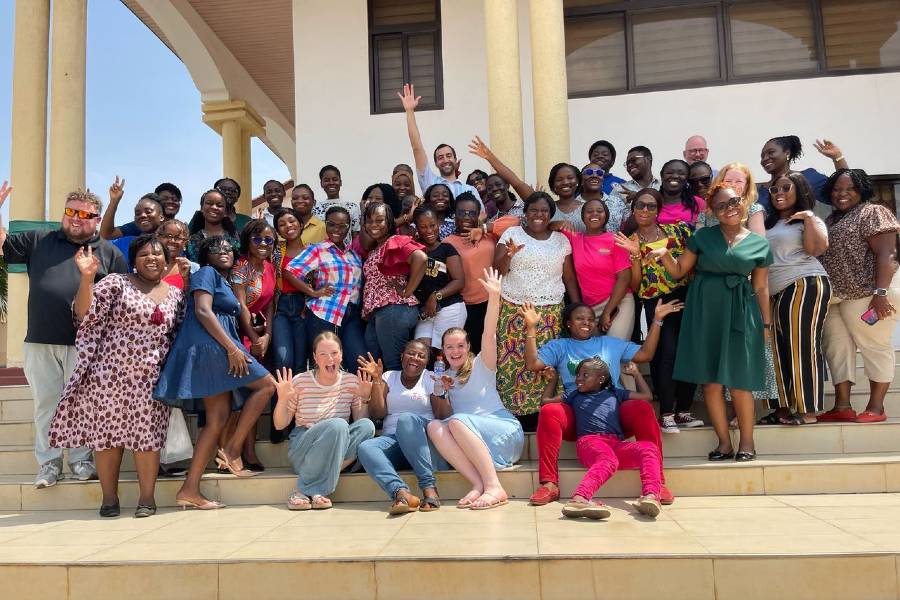
A deeper, authentic faith
During his time at Lipscomb, Thompson said his faith grew deeper and more authentic. No longer feeling pressure to present a polished exterior, he learned to embrace vulnerability and trust God’s strength in his imperfections.
“My time at Lipscomb has really helped me grow into a more authentic version of myself. I think, for a long time, I felt this pressure — especially being in ministry — to always have it together, to be the person people could count on, and to push aside my own struggles or limitations,” he said. “But through this program, and the people I’ve walked alongside, I’ve learned to be more honest about who I am, including my shortcomings. Instead of seeing those as things to hide or be ashamed of, I’ve started to accept them as part of being human — part of being created by God, imperfections and all.”
“I realized I am created in the image of God — not because of my achievements, but because of who He says I am,” continued Thompson. “That has changed how I parent, how I minister, and how I walk alongside others in their struggles. I’ve come to see that my deficiencies don’t disqualify me — they actually make space for God to work, to remind me that I don’t have to carry everything on my own. My faith became more of my identity and not just a side conversation. Through the self-reflection afforded to us in the program, I felt safe to wrestle with my faith and deepen it in ways I didn’t even realize I needed. I’m leaving this program more grounded in who God created me to be — not the polished, put-together version I thought I had to be, but my real, authentic self. And that’s been one of the greatest gifts of this experience.”
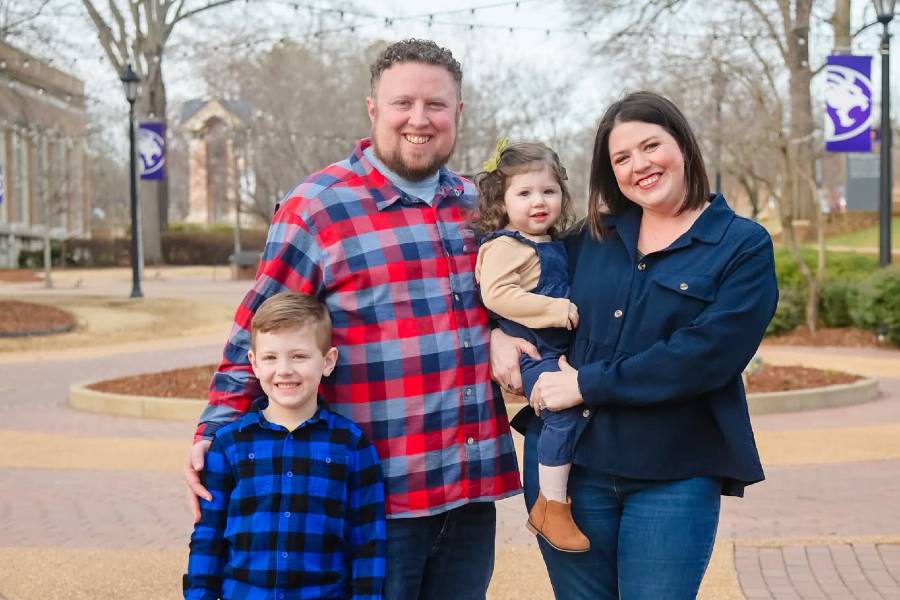
Thompson is celebrating this milestone with his family who he said sacrificed along with him through the process of earning his degree.
Looking ahead
After graduation, Thompson plans to transition into a full-time counseling role, ideally in a setting that allows him to combine counseling and ministry. He is also working toward becoming a Registered Play Therapist, fueled by a passion for child-centered therapy and expressive arts.
Longer term, he hopes to pursue a doctorate in counseling education and supervision, with dreams of mentoring future counselors as his Lipscomb professors have mentored him.
“This isn’t just the end of a chapter — it’s the beginning of something new and beautiful,” he said. “I’m excited to see how God continues to work in this next season of life. I fully believe that He’s going to place opportunities in front of me to not only walk with people through their mental health journeys but also to give back to this program that’s shaped me in such profound ways. Whether it’s through mentoring students, guest speaking, or even coming back to teach one day, I feel a deep sense of gratitude and responsibility to pour back into the place that invested so deeply in me.”
Reflecting on the journey, Thompson credits both his Lipscomb community and his family for helping him reach this milestone.
“Lipscomb has prepared me in ways that go beyond just academics or technique — it’s given me a sense of confidence in myself that I didn’t have when I first started. Coming to the end is bittersweet,” Thompson said. “It’s a relief to finally get some time back and rejoin those family moments I’ve missed, but I’ll genuinely miss aspects of this program — particularly the community that’s been built, the people I’ve learned from, and the rhythm of growing together multiple times a week. It’s been life-changing in ways I didn’t expect, and I’m so grateful for it.”
“My family sacrificed right alongside me — the missed ballgames, family dinners, bedtime stories,” he continued. “We carried that together, and now we get to celebrate this milestone together too. We did it.”